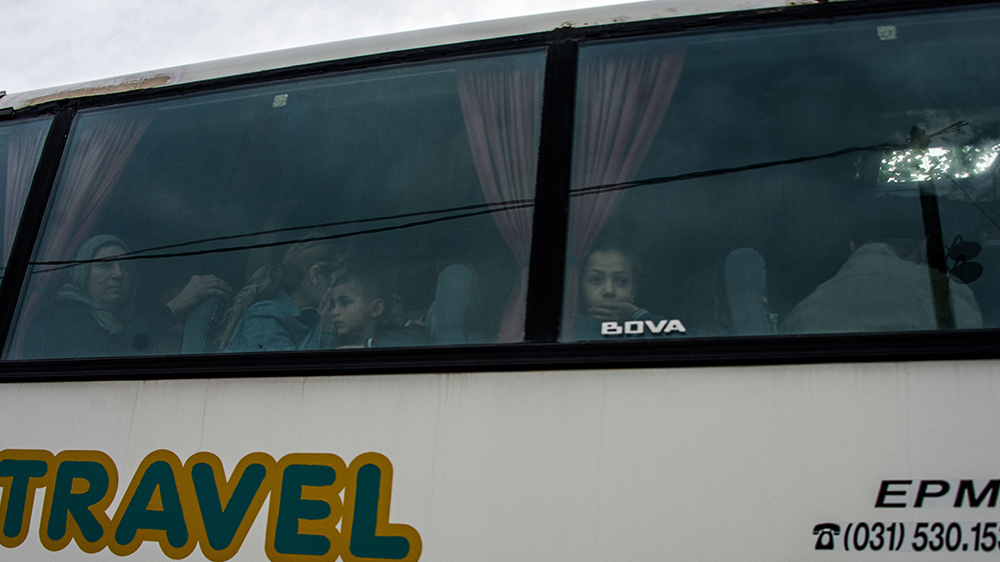Greek police move to shut down Idomeni refugee camp
Riot police launch gradual effort to remove more than 8,000 people from informal refugee camp on border with Macedonia.
![Idomeni evacuation [Dimitris Sideridis/Al Jazeera]](/wp-content/uploads/2016/05/438d117f21d540079365d315170051d0_18.jpeg?resize=730%2C410&quality=80)
Greek authorities have begun an operation to clear the country’s largest informal refugee camp in Idomeni on the Macedonian border, blocking access to the area and sending in more than 700 riot police.
The government’s spokesman for the refugee crisis, Giorgos Kyritsis, said on Tuesday that police would not use force and that the operation was expected to last about a week to 10 days.
Keep reading
list of 4 itemsAs Israel attacked Gaza’s north, 26 members of his family were wiped out
What is Trident, the US floating pier off Gaza? Will it work?
Does Israel’s Netanyahu have a plan for a ‘day after’ the war on Gaza?
By late afternoon, 32 buses carrying a total of 1,529 people had left Idomeni, police said, while earth-moving machinery was used to clear abandoned tents.
Police and government authorities say the residents will be moved to newly completed official camps, including in the second-largest city, Thessaloniki.
But many refugees fear the alternatives will be worse and have resisted moves to transfer them from Idomeni.
Vicky Markolefa, a representative of the Doctors Without Borders charity, said the relocation operation was proceeding “very smoothly” on Tuesday but voiced concern over the facilities where the refugees were taken.
“We are quite concerned whether these settlements are ready to host this amount of people in a dignified way,” she said.
The Idomeni camp, which sprung up at an informal pedestrian border crossing for refugees heading north to Europe, is home to at least 8,400 people – including hundreds of children – mostly from Syria, Afghanistan and Iraq.
At its peak, when Macedonia shut its border in March, it housed more than 14,000, but the numbers have declined as people realised the border was shut and began accepting authorities’ offers of alternative places to stay.
![Greek authorities began evacuating the camp near the Macedonian border [Dimitris Sideridis/Al Jazeera]](/wp-content/uploads/2016/05/fe425c0eed0f4c66b5d5f480cee25fd8_18.jpeg)
In Geneva, UNHCR spokesman Adrian Edwards said the evacuation appeared to be taking place “calmly” and the UN refugee agency was sending more staffers to Idomeni.
“As long as the movement of people from Idomeni is … voluntary in nature [and] that we’re not seeing use of force, then we don’t have particular concerns about that,” he said.
“It often does help to move people into more organised sites, when they’re willing to move to those places.”
In Idomeni, most have been living in small camping tents pitched in fields and along rail tracks, while aid agencies have set up large marquee-style tents to help house people.
Greek authorities have been sending in cleaning crews regularly and have provided portable toilets, but conditions have been precarious at best, with heavy rain creating muddy ponds.
Greek authorities are also eager to re-open a railway line – the country’s main freight train line to the Balkans – that runs through the camp and has been blocked by protesting camp residents since March 20.
In recent weeks, the camp had begun taking on an image of semi-permanence, with refugees setting up small makeshift shops selling everything from cooking utensils to falafel and bread.
![Idomeni camp was home to at least 8,400 people, including hundreds of children [Dimitris Sideridis/Al Jazeera]](/wp-content/uploads/2016/05/6d52f75804a34fcc9c5cf92cc31a509c_18.jpeg)
More than 54,000 refugees and migrants have been trapped in financially struggling Greece since Balkan and European countries shut their land borders to a massive flow of people escaping war and poverty at home.
Nearly a million people have passed through Greece, the vast majority arriving on islands from the nearby Turkish coast.
In March, the European Union reached an agreement with Turkey meant to stem the flow and reduce the number of people undertaking the short but perilous sea crossing to Greece, where many have died after their overcrowded, unseaworthy boats sank.
PHOTOS: The refugee crisis through the eyes of refugees
Under the deal, anyone arriving “illegally” on Greek islands from the Turkish coast after March 18 faces deportation back to Turkey, unless they successfully apply for asylum in Greece.
But few want to request asylum in the country, which has been struggling with a six-year-long financial crisis that has left unemployment hovering at around 24 percent.
 |
| Refugees and migrants are transferred on a bus to government camps from Idomeni [Dimitris Sideridis/Al Jazeera] |